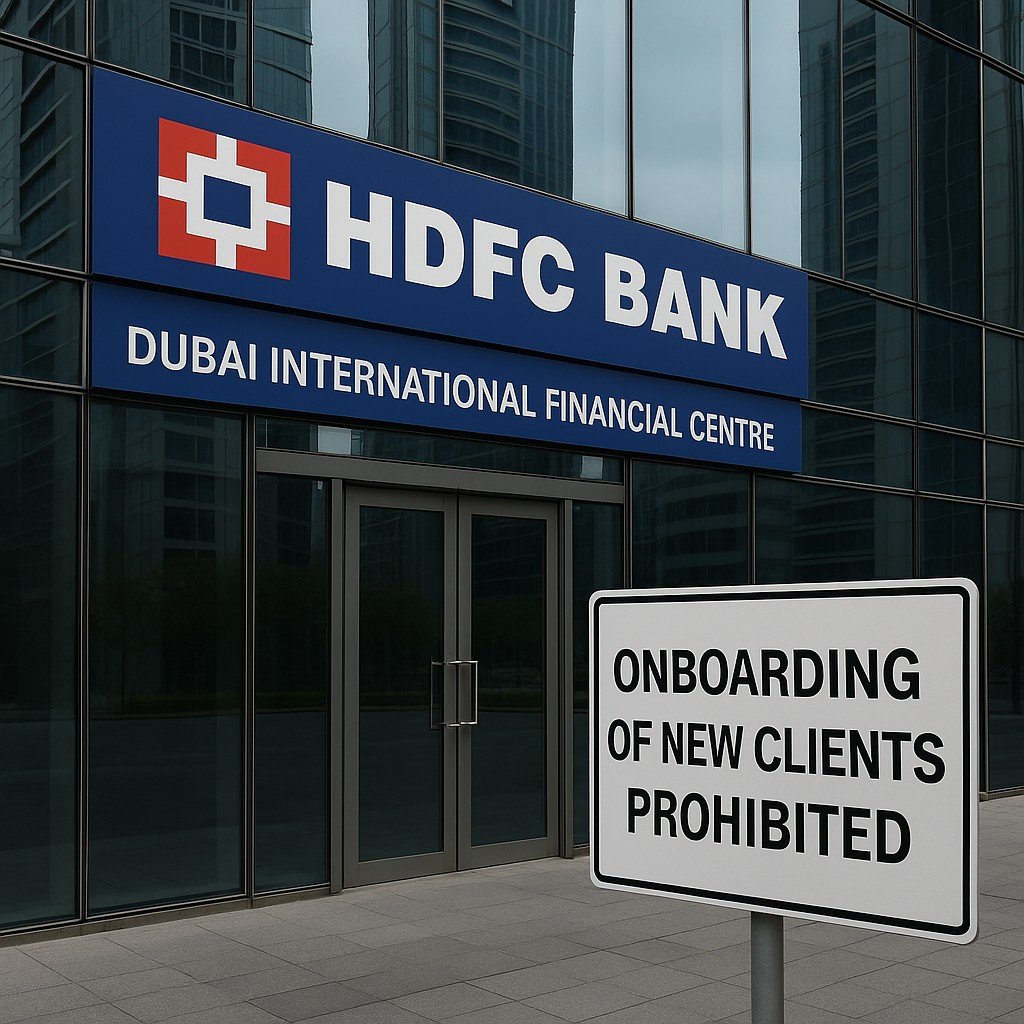
On 25 September 2025, the Dubai Financial Services Authority (DFSA) issued a Decision Notice restricting HDFC Bank’s Dubai International Financial Centre (DIFC) branch from soliciting, onboarding, or providing certain financial services to new clients.
The prohibition takes effect on 26 September 2025 and will remain in force until it is formally amended or revoked.
Existing clients remain serviceable, but the move raises questions about regulatory compliance, potential spillovers to HDFC’s GCC operations, and investor confidence.
What exactly is barred — scope & mechanics
What services / activities are restricted
According to the public register on the DFSA website, as of 25 September 2025, HDFC’s DIFC branch is barred from:
- Soliciting or conducting any business with new clients (i.e. those who had not completed the onboarding process by 25 September 2025) in respect of the following financial services:
• Advising on financial products
• Arranging deals in investments
• Arranging credit & advising on credit
• Arranging custody services - Engaging in financial promotions, soliciting, or onboarding new clients.
These restrictions are imposed under Article 75(1) of the Regulatory Law 2004 (as amended) in the DIFC/DFSA regime.
What is not barred / exceptions
- Existing clients who are already onboarded can continue to be serviced.
- Clients who had already been offered or provided services, but who had not yet completed formal onboarding before the cut-off may be allowed to complete the process under certain conditions.
- The prohibition is not stated to apply to non-financial banking operations (e.g. standard deposit accounts) unless those overlap with regulated financial services.
Effective date, duration & formalities
- The Decision Notice is dated 25 September 2025.
- The notice was received by HDFC on 26 September 2025, and the restriction is effective from that date onward.
- The prohibition remains “until otherwise amended or revoked in writing by the DFSA.
HDFC’s public filing to the BSE confirms these points and notes that the business of the DIFC branch is not material to the Bank’s overall operations, implying that they expect limited financial impact from this restriction.
Why DFSA acted: issues & regulatory red flags
While DFSA has not publicly disclosed every detail of its concerns, media reports and regulatory disclosures point to key themes:
- Onboarding lapses / non-compliance
The DFSA’s register notes concerns around how customers were onboarded — specifically, the branch carrying on regulated financial services for clients who had not properly completed onboarding. - Regulated services to non-onboarded clients
The decision notice explicitly targets past practices where financial services (advisory, arranging, custody) may have been extended to clients not fully onboarded per DIFC/DFSA standards. - Past controversies & reputational risk
The decision may also tie back to scrutiny over mis-selling or structural complexity of certain securities in HDFC’s UAE operations — for example, involvement of AT1 (Additional Tier-1) bonds and allegations that risk products were pushed through complicated cross-jurisdictional channels.
Some reports suggest complaints about misuse of fixed deposits by certain non-resident Indian clients in UAE operations, linked to product allocations. - Strict DIFC regulatory regime
The DIFC operates under a stricter financial regulatory framework (compared to general banking in UAE), with more stringent standards for client classification (retail vs professional), disclosure, risk, and compliance. Breaches in onboarding or promotional practices tend to draw stronger enforcement. (General observation from regulatory-regime literature.)
Given these, DFSA likely viewed the onboarding practices as a potential breach of its obligations under the regulatory laws and rulebooks, prompting a “pause” on new business until remedial action is demonstrated.
Implications & spillover risk
For HDFC Bank / DIFC branch
- The DIFC branch is effectively frozen for new business in regulated financial services. That curtails its growth potential, client acquisition, and frontier innovation in UAE / GCC financial markets.
- Although HDFC says the DIFC operations are not material to its core business, the reputational impact could be nontrivial — especially since this is public and may rattle investor confidence.
- HDFC will need to engage with DFSA, remediate gaps (e.g. internal controls, policies, operational deficiencies), and secure early lifting of the ban.
For GCC / Middle East operations & neighboring jurisdictions
- Other HDFC branches in GCC (e.g. Bahrain, if applicable) or allied operations (e.g. cross-referral activity) may come under scrutiny — regulators or counterparties may demand enhanced assurance.
- Clients in GCC and Middle East may re-evaluate their exposure or relationships to DIFC / UAE operations, possibly shifting toward jurisdictions perceived as more stable or transparent.
- Competitors with strong compliance reputations (Emirates NBD, Standard Chartered, Mashreq, etc.) may use this as a differentiator.
For markets and investor sentiment
- For Indian investors with exposure to HDFC’s international operations, this raises caution on cross-border regulatory risk, especially in less familiar jurisdictions.
- The stock market may react (though modestly) to the reputational risk; analysts might re-assess the bank’s global risk profile.
- Editorial and investor messaging may emphasize the need for stronger governance in overseas branches.
But limited immediate financial damage
- Since the branch operations are “not material,” the direct financial hit to HDFC Bank (India) is unlikely to be large.
- The fact that existing clients aren’t affected helps limit churn or disruption.
What to watch next
- DFSA follow-up actions
Whether DFSA issues further public statements, enforcement actions, or fines. The ban may be escalated if remediation is slow. - HDFC’s remediation and disclosures
How transparently and aggressively HDFC cooperates, upgrades compliance, and communicates progress. Also whether it revises its risk policies or branch structure. - Timeline for lifting the ban
Investors will watch for when DFSA amends or revokes the Decision Notice. - Regulatory ripple effects across other DIFC / GCC banks
Other foreign banks in DIFC may proactively audit their own onboarding protocols to avoid similar censure. - Stock market / analyst commentary
How Indian and UAE analysts interpret this — whether they downgrade the bank’s risk profile, or adjust valuation multiples due to regulatory risk.
The DFSA’s decision underscores how regulatory oversight in global hubs like Dubai can impact even the strongest financial brands. For HDFC, the path forward depends on swift compliance and regaining market trust.












